Why Everything Feels ‘Off’ Right Now In The Collective EnergyWhy does everything feel “off” right now? In this powerful Ask Me Anything (AMA) episode, Emily Aarons breaks down the collective energy shifts of 2025, why intuitives and sensitives are experiencing...
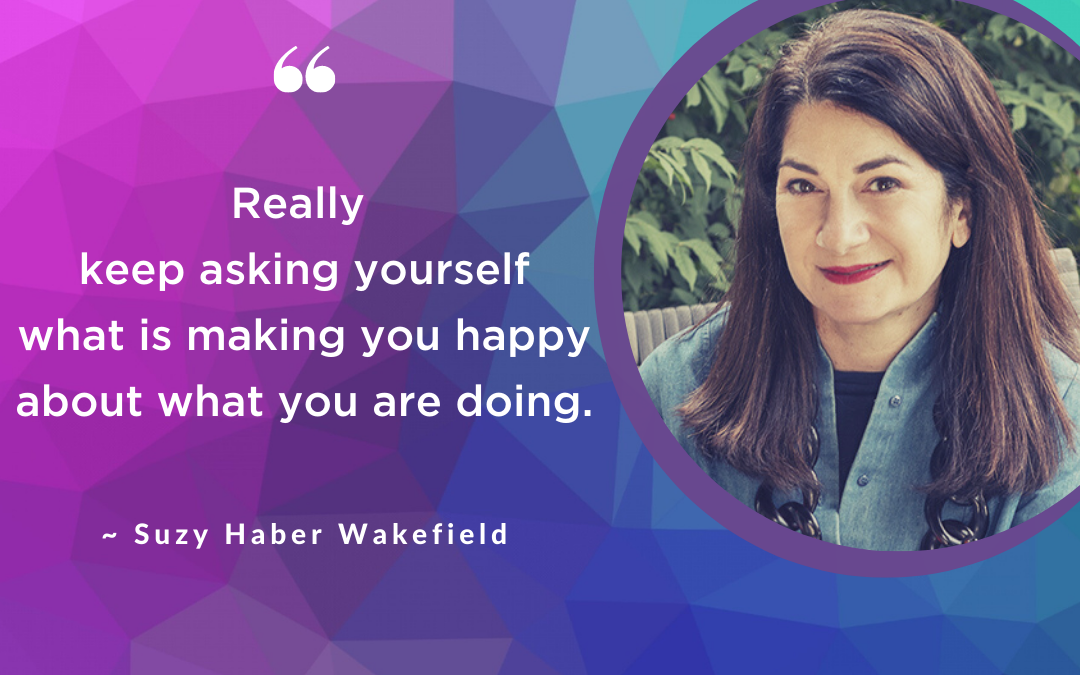
From Corporate To Creating Your Own Brand with Suzy Haber Wakefield
From Corporate To Creating Your Own Brand
with Suzy Haber Wakefield
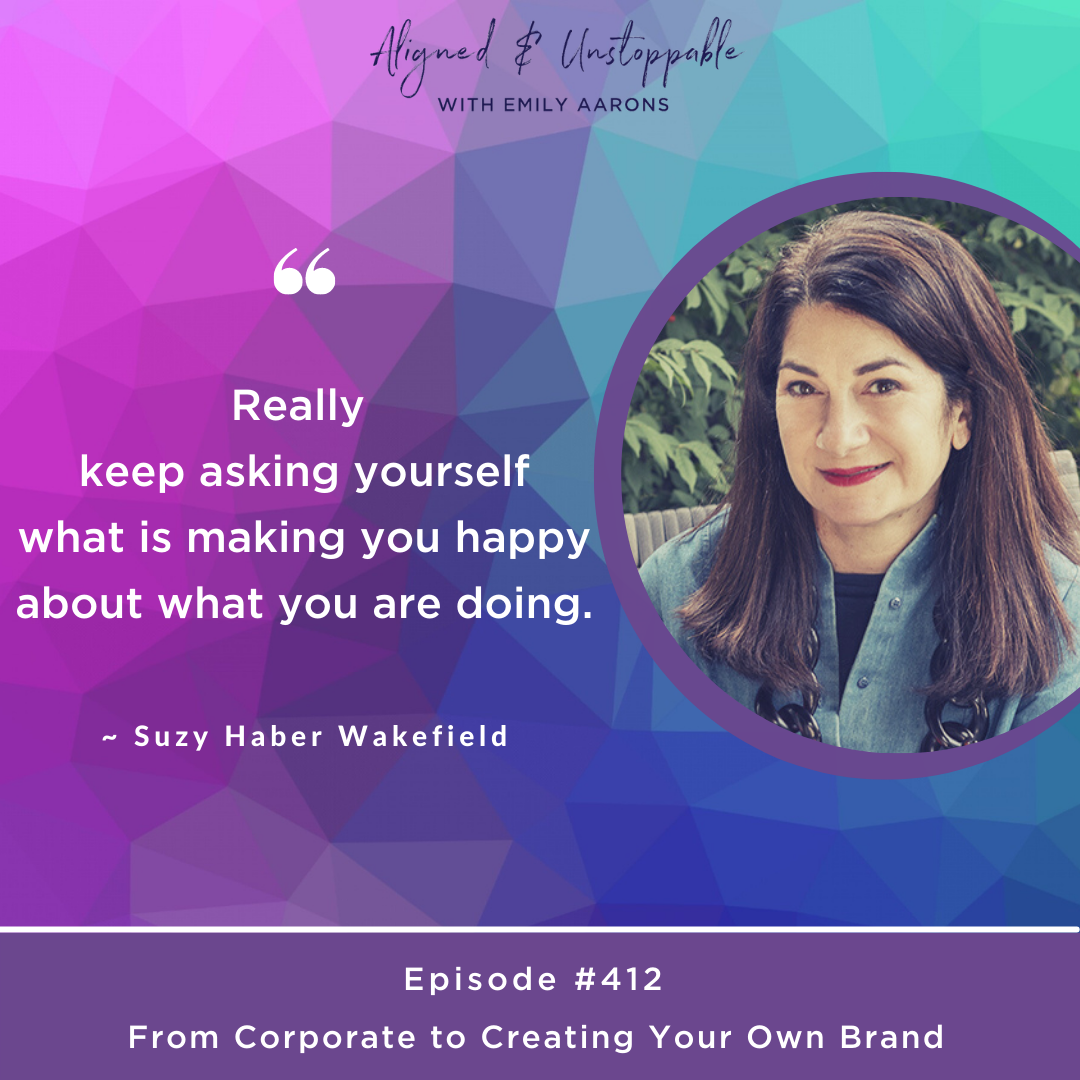
My guest today is an expert in brand development, as well as a great example of an entrepreneur who left the corporate world to create a life that felt more fulfilling.
Suzy Haber Wakefield knew at an early age she wanted to work in design in New York and she landed an amazing job in lingerie and apparel design with Victoria’s Secret.
Her 16-year career allowed her to travel the world and gain such valuable knowledge of brand development.
As her job evolved, she felt too far away from the creation process and the impact she knew she could make if she opened her own business.
She left her Corporate job to follow a path to a more fulfilling work life.
If you’ve ever left, or are thinking of leaving, the career you once loved but now you know it’s time for something different – this is the episode for you!
- [1.52] Suzy’s background in the apparel industry.
- [4.59] How moving up can actually lead away from your passion.
- [8.08] What it felt like to discover something was missing and finding out her current position didn’t feel fulfilling.
- [16.14] Working seasons ahead, for any entrepreneur.
- [18.18] Innovation comes in all shapes and sizes, even if you don’t think you’re a designer.
- [20.20] People are incredibly clever about what they feel is needed in the world.
- [23.04] Get out and meet more people!
- [24.12] Suzy’s vision for her brand going forward.
”Click
Hey listeners, welcome back to the podcast.
Today is a special episode. I’m joined by a guest. Suzy Haber Wakefield is here with me today and we were lucky enough to meet on an entrepreneurial female entrepreneur networking group, which is really exciting. And I mean, I joined so that I could meet more folks like you, Suzy. And so it checks my box to have you here today.
But also, it’s a true honor to have you here because I know your story is really one that the listeners can relate to from being in a corporate career to shifting into more of an entrepreneurial career and all the things that kind of came to making that decision. So for anybody who here is listening, who is still in a corporate career or transitioning to work for themselves, I think this episode is going to be one you’re going to want to listen to again and again.
So let’s dove right in. Suzy, please let the listeners know who you are and what you do in the world.
Hi, I’m Suzy Wakefield, and my design studio creates lingerie, swim and apparel to support brands that want to get their vision out into the world. So a lot of what we do is work with emerging brands or brands who are looking to extend category in the fashion space to be able to create an end-to-end concept, from concept and garment design to fitting it through, getting it produced. We love what we do.
That is so cool. I have one friend who has created an apparel line and it took her, I mean, from the time I met her, she’d already started the concept to when it was first actually produced about two years. Is that pretty average?
It is, especially for products that I specialize in, which are bras, underwear. The closer something is to the body, the more typically complex it is. And it’s hard for people because it’s like speaking a new language. Yeah, there’s it’s very decision-heavy. So if people need some guidance and need some help to really understand what are big decisions and what are small decisions and what is something that you can just launch the learn with?
Yes, I really love that. So and I also want to just quickly see this, that we’re going to include a link to the ultimate sort of brand development workbook. So for anybody who has a collection in mind, something that’s been on your heart and you’re wanting to bring it to life, this workbook is literally 20 pages. It is so detailed.
Even if you’re not thinking about creating a collection, I think you should download it because it’s going to help you to refine who it is that you’re talking to. And it has so many great details to see, like, you know, their mood and they’re like, there’s just so it’s so beautiful. So I definitely want to make sure that I mention that you guys can check out the link in our show notes. It’s completely free for all of our podcast listeners.
So because you’ve had this incredible background that you’ve learned the language, you’ve been, you’ve been in design for a very long time and sort of translating this new language to people who’ve never been exposed to it is like you have a full degree in it, so now you can share some of that knowledge and experience with people. So you’ve gone to art college and you kind of took that path into more of a corporate career, is that correct?
It is. It is. I actually grew up in Alabama and I, from the time I was little, knew I wanted to be a designer in New York City. And I came up to art school. I went to Rhode Island school design, which I picked because it was more of a fine art school that had a fashion degree. So then I moved to New York and eventually I started working for Victoria’s Secret. And I was very lucky that I originally got hired into what was at the time a think tank technician. So anything that I ever designed was for Victoria’s Secret.
But there were people who designed accessories for other brands within the corporation that were graphic designers. So it just it opened up my eyes to, first of all, that the many, many aspects of creating that people could create perfume bottles and people could create scents for those bottles and lotions. And it was a great experience because we were elbow to elbow with various creatives and it really planted the seed for years later being an entrepreneur on my own, because I what I discovered was I really loved working on various projects and through my career. They’re about 16 years. I was very lucky to learn as I travel the world, to be able to go see factories and see what innovations they were working on and these amazing people who were artisans in their own right, and then be able to take that knowledge to eventually go out on my own and help founders.
So what really gave you that itch to go out on your own? I mean, I know some people work for a corporate company and they just can’t stand their boss and they’re like, I can do better on my own. And then there are people who just have that hunger. Like you said, growing up in Alabama, you always knew you want to be a designer. As a kindergartner, I remember I knew I wanted to help people, but I thought maybe I would go in to be like a doctor. Because when you’re six years old, you don’t really know much about healing modality.
And so you always had that hunger. I always had that hunger. And I know many of our my listeners have that desire that that seed’s already been planted. And so even from a young age, you knew what you wanted to do, that maybe was it the corporate career wasn’t quite getting there for you and you wanted something more?
Well, exactly, Emily. So what I realized was I was lucky enough to move up the chain, and I got more and more people to manage, and I got further from the product. Yeah. What I really missed was being hands-on and, being in the weeds of the creativity versus managing a lot of people and the corporate ins and outs of volume building, which we were, which was fantastic. But it’s also groups that you’re looking at more of the corporate aspects than you are touching fabrics and working on products. And I felt like my gift was the impact that I can make on product. And creating versus what might have been a gift to be able to lead people but it wasn’t I wasn’t filling my well.
Yeah, I understand that. And for some people getting further away from touching fabrics and that textile connection might be ideal. Like, okay, I’ve put in my time and I, and I don’t want to have to work so hard anymore, but for you is like, no, that’s actually what brings you joy is being in that close-up belly to belly, as they say sometimes, like really being in that close-up position.
So what was that conversation like in your head when you really knew that you wanted to make that transition away from the corporate and to get closer to the actual product design and all of that? What was that conversation like?
It was tough because I mean, in a way, it was a decision that needed to be made because I was living in New York City with my husband and two young kids, and I was traveling six weeks, two months, a year. So there were also some calls of family realizing that I wasn’t really being filled in what I was doing day to day and I wasn’t being fulfilled and seeing my family as much as I wanted to. And it just seemed like something should be able to open up about this and the fact that I had always been. Told and felt lucky because I knew what I wanted to do. The older I got, the more I realized there’s a lot of people who go to college and have no idea what they want to do. And from such a young age, I did. But it didn’t. It was starting not to feel like. That was that I was really doing what I love to do, so I needed to recalibrate and I really needed to rethink what were the aspects.
\And so I actually left Victoria’s Secret to go back to a company I had worked for before, I guess because I got the opportunity to work with licenses to design for Kate Spade, Ralph Lauren again with tons of people.
But I really thought, well, maybe I just need a change of something that I keep learning. I mean, certainly there were so many smart people that I worked for and with over the years, but I felt like I’ve been there so long, at BS that I was learning from my own mistakes. So I wanted to give myself a chance to say new environment and learning something totally different, and that really working with the licenses just cemented for me that I loved having that pseudo kind of client relationship. Like I loved collaborating with people in their vision and magnifying it and designing it and really showing them like what the seed of an idea could turn into. And for me, I mean, I’m so geeky that still to this day I get a garment in and I see it on a fit model and I get excited. It’s just one of those things that. I would recommend to all of your listeners really keep asking yourself: what is making you happy about what you’re doing? And what’s maybe not quite. And do that, you know, as tragic as it is, that simple list of: what do I like to do? What am I good at? How can I possibly combine these?
Yes. I love that. And even just hearing you talk about, you know, it’s a simple question of what am I good at? What do I like doing? But I think sometimes when we’re in a career, we don’t stop. It’s like you’re on a machine, like the motor is running and you’re moving forward. And like, you know, I have one of my best friends was on track. She was in a career in finance and on track to be a partner. And, you know, it’s like, what makes you go, hold on. That’s not really for me. I need to make an abrupt change. And those are the questions that we should be asking ourselves, even as entrepreneurs, because I think the same thing can happen.
I know for myself, I noticed at the end of last year I was feeling really heavy with some of my programs, my coaching programs, and I realized I needed to take a break. And when I stopped, it was only in stopping when I realized, wow, I had been putting so much time and energy and love into this program. I hadn’t even thought of it because I was just going on, going on, going with the motions. And it was like a six-month group and another six-month group with another six-month group. And I’m holding all this space for people not realizing how much space I’m actually holding and my energy is being expanded and going out to so many people. And when I stopped, it was like, oh, my gosh, like there’s here I am again, and we have to be able to call ourselves out on those things. And for me it was very lucrative, but I also knew it wasn’t quite aligned to me anymore.
So I think you can take this question whether you’re in corporate working for somebody else or you are an entrepreneur and apply it. So. Okay, personal question. Do you watch design shows on TV and how do you feel about them?
You don’t. I don’t watch them at all. I have a lot of good friends who do now. I watch home makeover shows. Okay. I like some of those. I don’t watch anything fashion related, but I’m a complete addict to runway shows. Okay. So I follow all the seasons of runway, but I don’t watch the people, but I’m not really a reality like right-hander in my in my home life. I’m a real a severe law and order person. You know, I love, like, something totally different than what I do.
Totally. I totally get that. And I ask that because as you talk about the fit, I’m like, I’m thinking of Project Runway and I’m like, okay, so I watch it and I’m not an artist. I’m not a does. I mean, I guess I’m artistic in my own right, but I’m not a designer. And, and I look at it from that vantage point as like a regular person, but not from a designer standpoint. And so I always wonder, like, is it difficult to watch those things? Like, I know comedians who don’t watch comedy or listen to comedy because it’s like they can’t even enjoy it sometimes. And or some comedians say, I don’t want to listen because it’s like, I don’t want my stuff to be influenced somehow by what I saw somewhere.
I think that’s just an interesting question. So let’s bring it into today where you have your business, where you’re helping people to create and build their own designs, their own collections. Do most of your clients come with sort of a concept in mind and you help to kind of fan the flames or help to develop it? Or do they sort of have this fully developed thing and you help to put it on into the market?
It really depends. It’s kind of all of the above. Some people come to me when they’re a season or two and it’s kind of like, come on, take me away. Like people can muscle through one season. And then when seasons start building because in a fashion and apparel development, you’re not finished with one before you have to start the other. It’s a long process. So with that decision-making and build-on gets too heavy. That’s when people will sometimes come to me or when they are starting to get feedback from consumers like, Oh, I might have a little bit of a problem.
And also sometimes people will come who just have the seed of an idea and they have either a life experience or a desire for something. I think other people will too. And that’s my favorite kind of founder, because when I get something across my desk for real that is new and different and that I’ve never heard of or thought about the need for. I get so excited. And that’s another reason why I love what I do, because I learned from my clients all the time about different aspects that often they come from a financial world. Like most people who come to me. Are coming from that need. But there they were not trained creatively and come from a different industry, so they think really differently and I often learn from them in other aspects. And for me that’s another reason why I started my business, because I just want to keep learning. I mean, even, you know, Emily, being a business owner is a work in progress. Learning all the time.
Oh yeah. And I think even what you talk about the seasons with fashion, I mean, I think of my own seasons like we’re talking about I have a certification course that’s going on right now and we’re already talking about like we’re not complete with this season and we’re already talking about what’s the next launch going to be, what is it going to look like? And painting that picture so we can prepare.
And I kind of giggle to myself just today because I look at my calendar, I’m like, what is time really? Because like it’s like we’re looking at these days of the week and the month. So I’m like, okay, this launch is happening here.
We have to plan for that season and we’re talking about April and it’s today is August 18th, you know, so it’s like we’re looking out in the future and really having to position and project ourselves in that way in our business, just like a fashion designer would have to.
And you mentioned creating unique designs, and it made me think of my friend Yara dela Torre and she’s a hairstylist and she’s in a wheelchair. And she’s actually a guest. She was a guest on the podcast. Beautiful. Oh, my gosh. She’s an amazing coach. And this incredible story that she was paralyzed from the waist down from a freak accident that happened. And she has since just exploded her business, not just behind the chair, but also in a coaching capacity and as a speaker. And isn’t. She is.
And so when we are on the podcast, we were talking she was talking about how she had to design her like belt, basically, that she could have access to all of her tools because now she instead of standing and she could just reach for them. She was seated and then she had to design a different style chair for herself to be able to work around. And so, you know, that shift in her led to innovation and she found a designer on Etsy who made like tool belts. And so she had to work with this Etsy designer to basically custom design a belt that she could wear, like almost like a sling across her chest.
And it has like all these different pockets and things for every single thing that she’s got. And then she has like an apron that covers her lap so she doesn’t get color on herself. Like it’s she’s just taken that next level of innovation.
And she is somebody that during the pandemic, I mean, talk about innovation like she had to shut down her brick and mortar business and she’s in Key West, Florida, should have shut the doors because everybody in, you know, shut your doors in the pandemic. And she got calls to all of her clients and asked if they would like to have like little sample hair, you know, products delivered. And during the pandemic, she started to make these little gift bundles and package them and sell them and hand-deliver them to all of her customers during the pandemic so that they could get their products or touch up color or things like that.
And she sounds incredible.
She is incredible! But like, that’s the thing is, like, you might she might not have thought of herself as a designer or even to even consider making her own collection for people who have disabilities, who are either in the hairstyling industry or elsewhere. But for herself, she innovated and she’s continuously innovating to make things work.
You know, she’s one of those people who doesn’t make excuses for why she can’t do something. She’s like, I’ll figure out a way. I’ll do it, I’ll get it done. And I’m sure in fashion there’s some of that too. Like people creative is like having a problem with certain, maybe fit or fabric or things like that that they say this doesn’t work anymore and I’m going to innovate to something else.
Absolutely. People are incredibly clever about what they feel the need for, and that’s the best kind of product because we just don’t need more T-shirts in the world. We need things that feel different and specific. And that’s what’s really going to create true followers. So I forget who the person said that, you know, you just need, what, 100 or 1000 followers? Yeah. Yeah. And it really is the case because. There just doesn’t need more. That’s the same. We need more. That’s different.
Yeah, I agree. And it’s interesting. I see, you know, especially with lingerie and swimwear of how shapewear is starting to kind of show up in them. Like I saw, you know, bathing suits that have shapewear built into them that people are like, oh, look, it does this and it does that and it has.
And, you know, like I worked for Athleta years ago as a manager and even they would come in and talk about like the performance of all the fabrics. And we need to understand it wasn’t just like a pair of shorts or a t shirt, like they had all of the stuff created really intentionally with the stitching, with the fabrics, with the colors, like so many things are so intentional, and from the design point you’re like, Oh, that’s great and functionality. But then when we’re customer facing, we have to be able to share that information to make it worth like, okay, why am I starting $80 on this versus I can get it here for 15.
Right? Well, that’s the great thing about the opportunity for direct-to-consumer is that, people can now put so much of that on their side and they can really point out to consumers, here’s what the fabric does. Look at the scene, look at how it’s melted, look at how it fits around your bottom. And to your point, so much of that is innovation that’s been done in fabrications and fibers and fabrics that just help us as designers to make even better product.
And so how long have you been sort of in the Wild West, in your own working for yourself now?
About five years.
Okay, great.
Yeah, it’s just evolved. It started with word of mouth that people in my circles saw my career. And then that’s another thing that I really love about it. And I would encourage all your listeners, I’m sure you know, Emily and what we were just talking about, the Entreprenista League, just get out and meet more people because networking doesn’t have to feel like it’s this arduous spring. It’s kind of like Brian Grazer, I read years ago, talked about how his whole career he’s done these curiosity conversations. And of course, he’s a director. He he doesn’t just keep them within the film world or the art world. He met with Elon Musk before, you know, back in the day he meets with scientists. It’s like you never know what interesting packed life will bring. So it’s kind of like just building out circles.
Yeah, I agree. So where do you envision your company growing to? And like, what’s I know for me, I’m always sort of reaching for that next thing. And I see in my mind, I have this vision for myself and my brand. Where do you what’s your vision for yourself and your brand?
I would love to keep growing and expanding and what we are doing now. I also can envision for people who maybe couldn’t take on me as a director or my team as directly designing for them, being able to create a mastermind where I could still help founders in a way that’s more approachable for them.
The other aspect that I’m really interested in is that I see from my clients, a lot of them get investment either because they are so driven and people who are investing see that they will definitely get over the yard line or they have such an interesting marketing spin on their idea.
What I don’t perceive from where I sit is that investment is always actually the credibility of the product. So I’d love to work with the investment community to help be an advisor in that way of kind of a green, yellow, red light. Yeah. To do it for them. But just to take my experience and give some guidance to, oh, you might need them to invest in a little bit more of a team here. Or perhaps the idea needs to be a little more unique. Like I, I feel like there’s a lot of ways that my experience could help. To fortify investments?
Yeah, very much. That’s so unique, too. I mean, like things that I’ve never thought of that I’ve never considered that. And it’s really interesting because, I mean, I’m sure people are looking at if you are looking at creating a collection, you would need a substantial amount of money from investment. And if you are on a board that you could give them that feedback that would be so beneficial to both parties.
I think so. So let’s see where it goes. I’m putting it out of the universe.
Yeah, you heard it here first. You guys heard it here first.
So again, I want to mention again the download that you can get with this episode, The Ultimate Start-Up Brand Development Workbook. You guys can come over to the website or whatever listening platform you’re on. It’ll be right there in the show notes. We’ll have links to that.
I’m also going to give a link to the episode with Yara because I honestly, off the top of my head, I don’t know what episode that is, but it’s a great one. As well as the Entrepreneur Easter League. I know I have inquired about affiliate links because I know plenty of friends who would be interested in joining that networking group and so far so good. I’ve had a blast that I’ve only been in for a short period of time and met some really lovely people.
And like you mentioned, that episode, this episode is, you know, it’s really about creating those relationships and being in new circles. And sometimes our passion can get a little small, so it’s good to get out a little bit. And, you know, I think this is evidence of it. Like this is a beautiful collaboration with somebody who I would have never probably normally cross paths before. So this is perfect.
So let’s let everybody know how they can find you and learn more about you, your website and Instagram handle so that they can also tag you as they’re listening.
Fantastic. On Instagram, Suzy Wakefield Designs all one word. My website is Susie-Wakefield.com and you can also find me on LinkedIn Suzy Wakefield.
Great. Perfect and we’ll have that was linked as well.
Thank you so much for being our guest today, Suzy. It was really a joy and really nice to have somebody on the podcast that does something a little bit unique but also has a message that people can hear themselves in your story of being inspired and being led internally to do that next great thing that feels amazing for them. So thank you for sharing with us today.
Thank you, Emily. It has been such a pleasure and I look forward to listening to a lot of great episodes you have.
Amen on that. All right. Thank you so much.
Thank you.
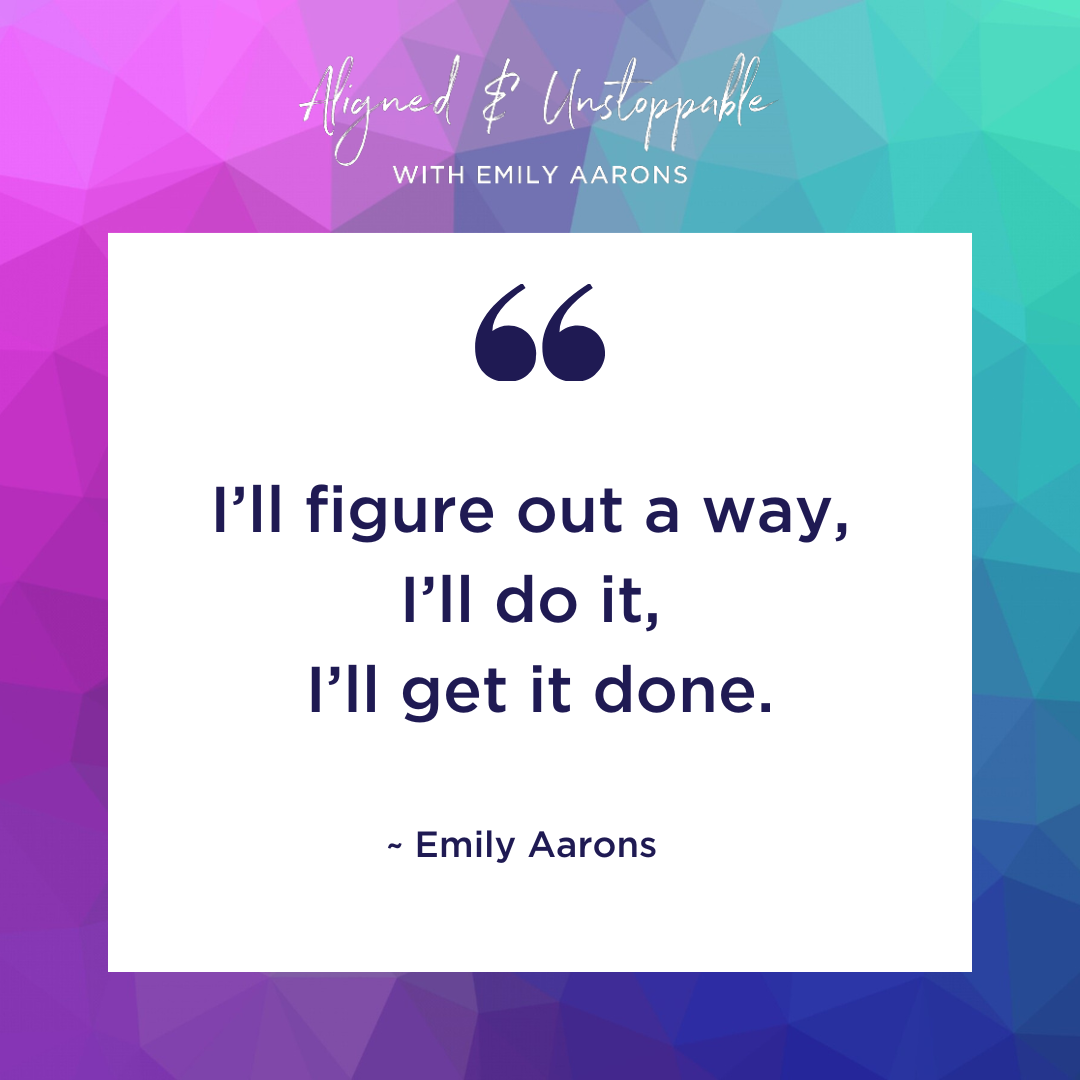
Action Steps To Align Your Biz:
Get out and meet more people! Start networking and growing your business with help and support instead of trying to do everything on your own. You don’t have to go it alone.
About Suzy
After a 20+ year career in corporate fashion design, holding C-suite positions for world-class brands, Suzy began Suzy Wakefield Designs, with a mission to create and produce outstanding lingerie, swim, and apparel designs that bring a fashion founders’ vision to life.
You can find her here:
Love this episode? Tune into the next one!
Please consider subscribing to this podcast and leaving an honest review. Your ratings and reviews really help and I read each one.
You can also listen on:
Check out more episodes!
Ep 453 Why Everything Feels ‘Off’ Right Now
Ep 452 How To Create Your First High Ticket Offer
How To Create Your First High-Ticket OfferIf you’ve been dreaming of creating a high-ticket offer but the how feels overwhelming, this episode gives you the simplest, soul-led pathway to build an offer your clients love — and confidently charge the price your work...
Ep 451 Building a Six-Figure Spiritual Business Without the Hustle
Building a Six-Figure Spiritual Business Without the HustleReady to build a six-figure spiritual business without complicated funnels or burnout? In this episode, Emily reveals how she scaled from $12K/year to multi-six figures by leading with intuition, energy...

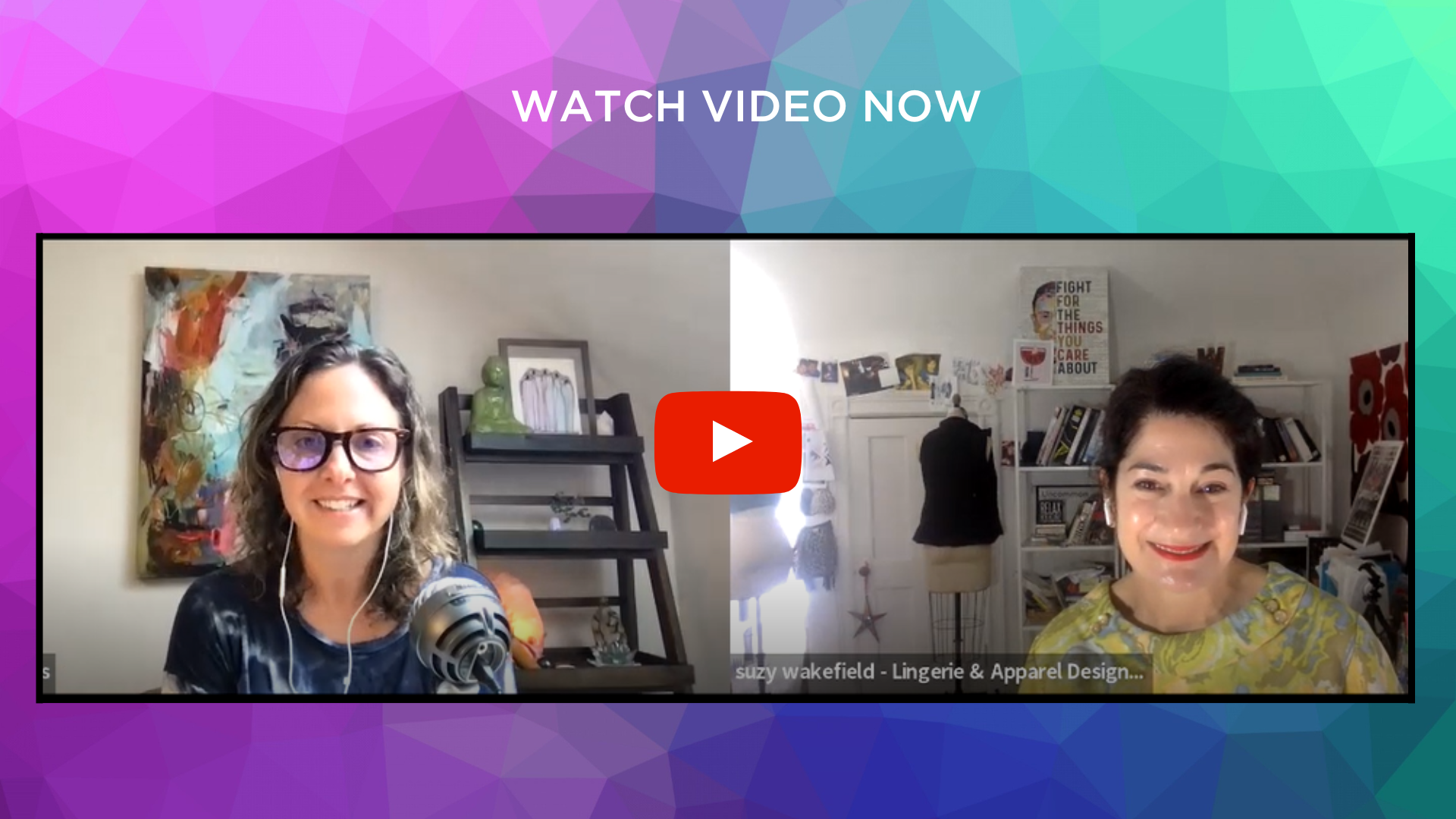
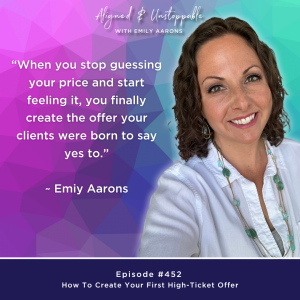
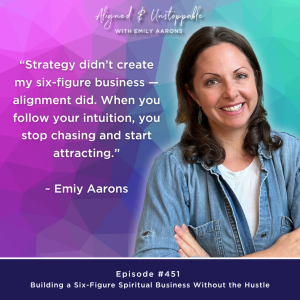
Recent Comments